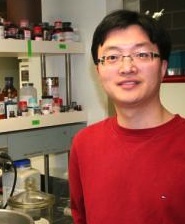Lei Chen stays awake some nights looking for solutions to a complex problem.

As a postdoctoral scholar in the University of Iowa College of Pharmacy, Chen is helping synthesize the anticancer natural products superstolides A and B, substances found in marine sponges in the waters off the island New Caledonia in the southwest Pacific Ocean.
"This is the most challenging work, so I wanted to get trained in this area," says Chen, who earned his Ph.D. in organic synthesis from the Shanghai Institute of Organic Chemistry. "You need self-confidence. You need to search for new reaction conditions."
Chen and his mentor, Zhendong Jin, associate professor of medicinal and natural products chemistry, are using their own methodology to create enough material for researchers to conduct biological investigations, which will allow the possibility of anticancer drug development.
"This is a new structure type that has never been identified before. Nobody knows why this compound has very good anticancer activity. The data are very limited,” Jin says.
"This is a tough project. It’s mentally very demanding. It can drive people crazy — literally. You need 100-percent concentration.”
Jin feels Chen is the right person for the job.
"Lei is the best postdoc I’ve ever had,” Jin says. "He has determination, knowledge, ambition, work ethic, and skill. He has a passion to finish it. The most amazing thing about Lei is he has a very sharp eye for pinpointing where a problem lies. This intuition is not something everybody has.”
Chen worked with Zhengmao Hua, who earned his Ph.D. at the UI in 2006, to complete the methodology paper that established how to synthesize superstolides A and B.
Now, he’s making the complicated molecules out of inexpensive, commercially available material. Several laboratories around the world are competing on this project.
"You need to think about how to solve the problem, how to design the reaction to result in a high yield," says Chen, who has worked in Jin’s lab for just over three years. "Then, you need to work hard."
Jin expects to have his lab’s work completed in the next few months, and believes this accomplishment will advance the field of science.
"This is an example to showcase the usefulness and versatility of our methodology," Jin says. "If we can make a substantial amount of material for this molecule, then we’ll be able to produce more material than people can harvest by scuba diving."